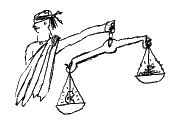"It isn't fair!"
"You keep saying that. I only wonder what is your basis for comparison!"
Sarah and the Goblin King in Labyrinth
The Goblin King's retort is a valid one. But what does it mean? What is `fair'? What is `fairness'?

Fairness is a very popular concept in today's society. You hear more about `fairness' than about justice or equality. But good definitions of what is fair or not fair are hard to come by.
Suppose we start with an example. It is up to you to divide a piece of cake between two children. How do you do so fairly? An obvious answer is to cut the piece into two equal halves and give one to each child. This has the advantage that neither child can complain that the other child got the bigger piece. However, is it fair? Suppose one child was 13 months old and most of the cake was destined to end up on the child instead of in the child. What if one child had just won a soccer game? What if one child wasn't hungry?

The secret problem behind all this is that, in order to achieve fairness as most people imagine it, each person should get a share proportional to their desire. This involves making an objective measurement of different peoples' emotions, so they can be compared. Emotions are intrinsically subjective, and no method exists for measuring them directly.
Factor in different circumstances (how about one child being diabetic?), and the problem becomes even more complex.
Suppose you gave the entire piece of cake to one child, and none at all to the other? What would happen then? "It isn't fair! Why didn't I get any cake?", one child would wail. Now, if you didn't give any cake to either child, this complaint would not arise. Even though the child's situation is identical in the two cases, one is cause for unhappiness. In essence, by doing something nice (giving cake to one child), another child assumes you've done them a disservice. Why is this?
This is basically a case of failed altruism. Human beings are basically self-centered. We don't want to miss out on anything good that's going around. It's hard to take joy in other peoples' good fortune. And this is a darn shame.
The Bible says "Love thy neighbor as thyself." This, in fact, is the distillation of the entire book. And it's the admonition most people seem to miss, even literal-minded zealots who read the Bible every day and actually imagine "Suffer not a witch to live" is an injunction to kill off Wiccans (it's actually a translation error). Bill and Ted also preach the same doctrine; I'm rather fond of their phraseology:
"Be excellent to each other."
Not a bad idea.
Back to fairness. As we have seen, fairness is difficult to define, impossible to measure, and impractical to achieve. Everybody seems to know when something is unfair to them, but reaching a consensus on what would be fair is beyond most.
Some people try to find ways to implement "fairness" by having people express their desires, and a (theoretically) disintrested third party makes a decision based upon the evidence. Naturally, this process is fraught with temptation to overrepresent one's own desires. In effect, dishonesty is rewarded. Not a workable solution.
Back to the cake-cutting example, one popular dodge known to parents everywhere is to have one child cut and the other choose a piece. This does eliminate the necessity of cutting exactly identical pieces, and forestalls arguments that one child got a bigger piece. However, it doesn't address the basic problem: does a 20-pound child get the same amount of cake as a 120-pound child?
On the old Charlie's Angels set, in order to avoid the impression that one or another star was being favored, anything that one actress would get, the others would also get. So if one wanted a Ferrari, they'd each get a Ferrari. Even if they didn't want one. If another wanted a Corvette, they'd all get Corvettes. As you can see, indiscriminate application of equality in pursuit of fairness leads directly to waste. And equality is not fairness. However, equality is at least achievable.
I've had this sort of situation in my own relationships. Since my ego is pretty self-sustaining, I have no stake in winning arguments or always doing things my way. If I don't care about something, I'm happy to do it someone else's way. This has nothing to do with fairness, simply reasonableness. There's no point in arguing about something you don't care about. The other person felt bad about it, she thought she was always getting her way, and I was being a doormat. So when I did care about something, she'd always do it my way, to atone for her sin of doing everything else her way. This made no sense to me. I hadn't "earned" anything by failing to dispute items when I had no preference. But, trying to adhere to her own personal concept of "fairness", she ended up always doing things my way, including doing things she actively disliked any time I expressed a preference. By her way of thinking, this arrangement should have seemed unfair. It works a lot better when both (or all) people involved let someone else decide when they don't have a preference ("my way"). When people have conflicting preferences, then the old problem of deciding how to resolve it returns, but in practice this doesn't happen very often. A more frequent failure mode is a gaggle of people, all saying "I don't care, what do you wanna do?" Going the other way, both people could take up positions on every decision, whether they cared or not ("her way"). The result of this is that a lot of energy gets expended arguing about every little thing, often for no particular reason.
The way I see it, "fairness", as imagined by most of the people I meet, is simply not achievable, and attempting it is a waste of time, energy, and emotions. People end up drained, unsatisfied, and generally unhappy. So I advocate reasonableness instead. It seems harder (both actual mental effort and a genuine sense of altruism are required), but in my opinion it's less effort in the long run, and people end up happier.
Sometimes I even give the other kid my piece of the cake.
John Rehwinkel